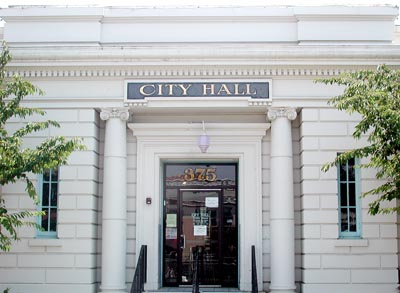The Hollister City Council will wait until it hears from the state attorney general before it considers raising the Christian flag in front of City Hall.
The council on June 21 voted 3-1 to request a letter from Attorney General Rob Bonta regarding the legality of flying a religious flag on government property. Councilmember Rolan Resendiz dissented.
In May, the council adopted a policy that allows residents to petition the city to fly a flag at City Hall. The application must receive 100 signatures in order for the council to consider it.
The Pride flag in recognition of the LGBTQ+ community was raised at the beginning of June, where it will fly through the end of the month.
Councilmember Rick Perez submitted an application to the city requesting the flying of the Christian flag in April 2022, gathering 120 signatures.
He pointed to the city’s flag policy, which states that flags must not discriminate against any person or group based on religion and other factors.
“If this represents a portion of our community, we should put it up,” he said. “Is everyone going to like it? Probably not. There’s some people that don’t like the Pride flag, and that’s on them. This pole is supposed to be a community pole. This is part of our community.”
Mayor Ignacio Velazquez said he had concerns about flying a flag over City Hall that represents a religion. He suggested the city seek an opinion from the attorney general before making a decision.
“I think the separation of church and state is government 101,” Velazquez said. “This could lead to more issues, definitely lawsuits from those that want to make sure of the separation of church and state.”
Resendiz agreed, saying the city cannot use public funds to display religious beliefs. He added that he took offense to the proposal, suggesting that it was in response to the recent approval of the LGBTQ+ flag.
“I feel like it’s a veiled attack against the LGBTQ+ community, in my opinion,” he said to Perez. “If we did not have the discussion for the LGBTQ+ flag on our flag pole, you never, in my opinion, would’ve wanted a Christian flag up there. It’s a tit for tat and it’s very petty for us to go down that path.”
According to the American Civil Liberties Union, the First Amendment’s Establishment Clause prohibits the government from taking an action “respecting an establishment of religion.”
The “endorsement test,” which courts often use to determine if a religious display is constitutional, according to the ACLU, asks if a person views the display as government endorsement or disapproval. If so, the display may be considered unconstitutional, but the U.S. Supreme Court has been in a “state of flux” regarding the test, the ACLU states.
Perez said the flag would allow Christians to feel that they are represented.
“I have no qualms against any flag,” he said. “I’m not here to judge anyone. This isn’t about tit for tat. It’s not because of my sexual orientation or anything else. It’s part of our belief system.”
The Christian flag was created in 1907 by Charles Overton, who worked with religious organizations to promote it as a banner representing all Christian denominations, according to Christianity Today. The Christian flag has a white field, with a red cross against a blue background in the upper left corner.
The council is expected to consider approving the flag request in October, provided it has a response from the attorney general.
A similar request from a citizen was denied by the City of Boston, Mass. in 2017, and has been stuck in litigation since then. In January 2021, the U.S. Court of Appeals for the First District ruled that the city could legally deny the request by Howard Shurtleff to fly the Christian flag—or any religious flag—over Boston City Hall, according to Courthouse News Service. The three-judge panel determined that the city’s refusal to fly the flag does not discriminate against religion nor violate the plaintiff’s First Amendment right to free speech.
The Liberty Counsel law firm has been fighting the lawsuit on behalf of Shurtleff, and recently petitioned the U.S. Supreme Court to consider overturning the First Circuit’s decision, according to LGBTQ Nation.










